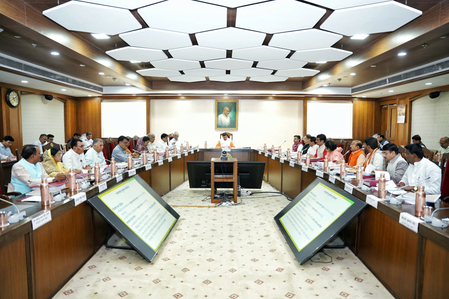MP cabinet rolls out farmer-centric reforms; Bhavantar revival, millet boost, MSME push
Bhopal, Oct 14 (IANS) In a sweeping set of decisions aimed at bolstering agriculture, tribal livelihoods, and economic growth, the Madhya Pradesh Cabinet on Tuesday approved key initiatives in a meeting chaired by Chief Minister Mohan Yadav.
Urban Development Minister and government spokesperson Kailash Vijayvargiya informed that these decisions are “transformative for farmers and marginalised communities,” emphasising the state’s commitment to self-reliance amid challenging market conditions.
At the forefront is the revival of the Bhavantar Bhugtan Yojana (Price Difference Scheme) for soybean farmers, reintroduced after an eight-year hiatus following farmer demands for minimum support price (MSP) protection.
Madhya Pradesh, India’s “soybean bowl” producing nearly 60 per cent of the nation’s output across 66 lakh hectares, has seen prices plummet due to oversupply and erratic weather, with many farmers fetching below the MSP of Rs 5,328 per quintal.
Under the scheme, the government will calculate an average mandi rate and compensate the price gap directly into farmers’ accounts via DBT (direct benefit transfer).
Registration opened on October 3 and runs until October 17, with implementation from November 1 to January 31, 2026.
“Farmers won’t suffer losses; we’ll bridge the gap,” Minister Vijayvargiya assured, countering past criticisms of delayed payments from the 2017 rollout that crashed prices by 30-35 per cent.
To champion climate-resilient ‘Shri Anna’ millets, the Cabinet greenlit the formation of the Sri Anna Federation for kodo and kutki millet varieties, vital for 11 tribal-dominated districts like Mandla and Dindori. These nutrient-rich grains, grown by over 18,000 Adivasi women through SHGs, now fetch MSPs of Rs 3,500/quintal for kodo and Rs 2,500/quintal for kutki – up from earlier lows of Rs 12/kg. An interest-free Rs 80 crore loan will fund marketing, value addition, and processing into products like cookies and cereals through the Federation, boosting incomes from Rs 12/kg to Rs 80-90/kg.
“This empowers tribal women, aligning with the national millet mission for food security,” he said, noting a 50 per cent production dip in recent decades due to shifting preferences.
Sericulture gets a fillip via the enhanced Resham Samridhi Yojana (Silk Promotion Scheme), raising input subsidies from Rs 3.65 lakh/acre to Rs 5 lakh/acre. Farmers’ contributions drop to Rs 1.25 lakh/acre (from Rs 1.56 lakh), with SC/ST beneficiaries limited to just Rs 50,000 – easing entry for smallholders in Chhindwara and Burhanpur hubs.
For MSMEs, a Rs 105 crore allocation under the World Bank-backed RAMP (Raising and Accelerating MSME Performance) scheme targets quality upgrades, market access, and greening. The state will contribute 30 per cent to central funds, unlocking loans for 6,000+ units (47 per cent women-led), fostering jobs in renewables and exports.
“MSMEs are dignity engines; this will create self-reliant entrepreneurs,” the minister added. In human interest nods, the Cabinet granted an out-of-turn promotion to Constable Arun Singh Bhadoria, PSO (personal security officer) to Rau MLA Madhu Verma, for saving the legislator’s life with CPR during a September 24 heart attack in Indore. Doctors praised his timely intervention, which stabilised Verma post-surgery.
Additionally, Rs 170 crore will hike pensions for pre-2016 retirees under the 6th and 7th Pay Commissions, benefiting over 4.5 lakh elderly, the minister said.
Finally, SC/ST students gain access under ‘Sardar Vallabhbhai Patel Coaching Scheme’ to national-level coaching institute with Rs 1,000 monthly residence aid, targeting 5,000+ aspirants for exams like JEE/NEET/UPSC.
“All are welcome; education breaks barriers,” he urged.
–IANS
sktr/svn



Comments are closed.